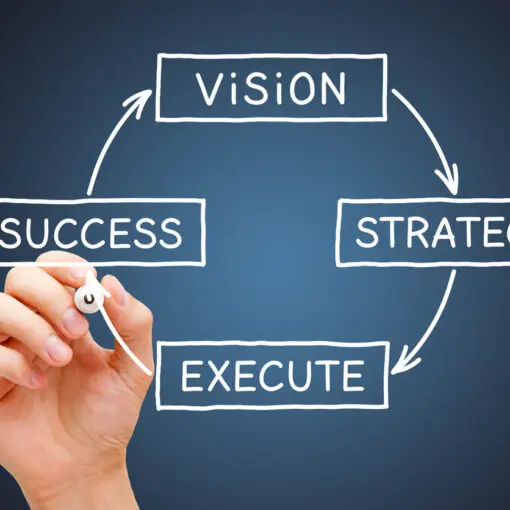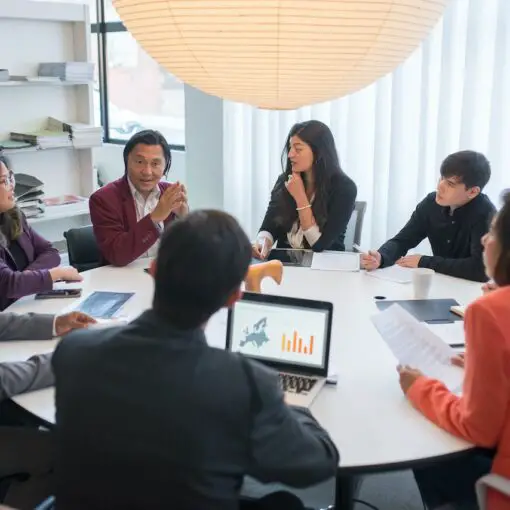Selecting the right candidate who can think strategically is essential for the success of any organization. Strategic thinkers have the foresight and planning capabilities that enable companies to navigate complex challenges and seize opportunities. Consequently, interview questions that reveal an individual’s strategic thinking skills are crucial tools for recruiters. They are designed not only to gauge a candidate’s ability to think critically and long-term but also to assess their problem-solving methodologies and potential impact on the organization’s growth and innovation.
To identify individuals with the strategic acumen necessary for high-level performance, hiring managers need to ask the right questions. These questions must be carefully crafted to probe the depth of a candidate’s strategic thinking and how they apply it in practical scenarios. The ability to anticipate trends, analyze complex situations, and craft actionable plans separates strategic thinkers from other candidates. Such capabilities are integral to leadership roles and positions that require making significant decisions that shape the direction of the company.
Key Takeaways
- Identifying strategic thinkers is crucial for organizational success.
- The right interview questions can reveal a candidate’s strategic capabilities.
- Strategic thinking is vital for leadership and significant decision-making roles.
Understanding Strategic Thinking


Strategic thinking is a process that combines critical thinking and long-term planning, which is essential in guiding businesses through complex environments. It involves a clear understanding of an organization’s current positioning and the vision to progress towards future objectives.
Defining Strategic Thinking
Strategic thinking is a comprehensive mental process employed by individuals at every level of an organization to analyze the current business landscape and devise long-term plans. This distinct thought process is characterized by the ability to anticipate future consequences and trends, understand the uncertain business environment, interpret the significance of these elements for the organization, and prioritize actions accordingly. Strategic thinkers often utilize decision-making skills and critical thinking to set clear objectives and construct a path to achieve them.
The Importance of Strategic Thinking in Business
The pivotal role of strategic thinking in business cannot be overstated. In an era where change is constant, the capacity for adaptability within organizational culture is a significant determinant of long-term success. Strategic thinking equips leadership with the foresight required to steer a team towards enduring success, while also fostering an environment where every team member can contribute to the organization’s vision and strategy. As a business competency, it enhances decision-making skills and prepares companies to respond proactively to industry shifts.
Key Attributes of Strategic Thinkers
Strategic thinkers stand out due to a set of core attributes that allow them to make significant contributions to their organization. These attributes include:
- Vision: They establish clear goals that align with the business’s direction and purpose.
- Leadership: They influence others, inspire action, and drive the team towards strategic goals.
- Adaptability: They adjust strategies based on environmental changes and emerging opportunities.
- Organizational Culture: They propagate strategic thinking throughout the culture, encouraging all members to think proactively.
- Decision-making skills: They use informed judgment to make decisions that will impact the future state of the business.
- Critical thinking: They objectively analyze and evaluate issues to form a judgement, often challenging the status quo for improvement.
Strategic thinkers are invaluable assets to any team, as their approach to challenges and opportunities can significantly affect an organization’s trajectory.
Example of Interview Questions for Strategic Thinking
- How much time per week or month do you invest in strategic planning?
- Can you tell me about a time when you had to make an important decision with limited information?
- Describe a situation where you had to make a tough strategic decision with incomplete or ambiguous information. How did you approach the situation?
- How would you go about connecting the dots and identifying the interrelationships and interdependencies in a complex situation?
- What methods do you use for strategic planning?
- Can you provide an example of a successful strategic decision you made in the past?
- How do you ensure that your strategic plans align with the overall goals and objectives of the organization?
- What do you do to stay updated on industry trends and changes that could impact the organization’s strategy?
- Can you describe a situation where you had to change your strategic approach midway through a project or initiative? What prompted the change and how did you handle it?
- How do you assess and mitigate risks when developing and implementing a strategic plan?
These questions can help evaluate a candidate’s ability to think strategically and make informed decisions. (source: Workable, TalentLyft)
Developing Strategic Interview Questions


Effective strategic interview questions uncover a candidate’s ability to plan and achieve long-term objectives. They help identify an individual’s analytical skills and their capacity to adapt and innovate in changing environments.
Crafting Questions on Planning and Goals
When developing interview questions focused on planning and goals, employers should probe candidates on their prioritization techniques and long-term goal setting. An example question might be: “Describe how you align daily activities with the broader, long-term strategy of an organization.” This assesses a candidate’s foresight and understanding of how day-to-day operations contribute to achieving strategic objectives. For insights into their planning process, ask, “How do you identify and integrate key milestones when planning for a project?”
Assessing Analytical and Problem-Solving Abilities
Questions designed to evaluate a candidate’s analytical and problem-solving abilities should challenge them to demonstrate their methodology in breaking down complex problems. One might ask: “Can you walk us through a past scenario where you used analytical skills to influence a strategic decision?” This question requires the candidate to share specific instances of their problem-solving approach. Another question could be, “Discuss a time when you had to analyze data to develop a strategy. What was the outcome?”
Evaluating Adaptability and Innovation
To gauge a candidate’s adaptability and innovation, it’s essential to ask how they handle unexpected changes and new challenges. An apt question could be: “Provide an example of how you’ve adapted your strategy in response to unforeseen circumstances.” This allows candidates to display their resilience and ability to pivot effectively. Additionally, inquire about their innovative capabilities with, “How have you integrated new technology or ideas to advance strategic goals in past roles?” to bring to light their innovation in action.
Evaluating Candidates’ Strategic Capabilities
When interviewing for strategic roles, it is crucial to discern how well candidates grasp the complexity of a business and the skills necessary to navigate its challenges effectively. Their ability to think strategically can be the difference between a company that stays ahead of the curve and one that falls behind.
Exploring Past Experiences and Decisions
Candidates often reveal their strategic capabilities by discussing their past experiences. Interviewers should ask about specific projects where significant decision-making was required. For instance, inquiring “Can you describe a project where you had to anticipate market trends and adjust your strategy accordingly?” helps gauge their understanding of market trends and the company‘s positioning against competitors.
- Example Question: How have you adjusted a project strategy in response to market changes?
Gauging Understanding of Business and Market Context
Understanding the broader business and market context is key for strategic thinkers. They should be able to analyze and interpret market trends and competitors, and their impact on the company. Asking “How do you assess the potential risks and opportunities when entering a new market?” can uncover candidates’ abilities to navigate these complexities.
- Key Areas to Explore:
- Risk assessment and mitigation
- Opportunity identification in new markets
Identifying Leadership and Teamwork Qualities
Strategic roles often require strong leadership and the ability to work effectively within a team. Questions that probe into how candidates foster effective communication and collaboration can illuminate their leadership qualities. Consider asking, “Can you give an example of how you led your team through a challenging strategic project?”
- Leadership Qualities to Assess:
- Effective Communication: Clarifies and shares the strategy with the team.
- Collaborative Decision-Making: Engages with team members to reach informed decisions.
Strengthening Strategic Thinking in Your Organization
Organizations aiming to remain competitive must prioritize strategic thinking as a core competency. By embedding it into the company culture, investing in development resources, and fostering interdepartmental collaboration, they can build a robust foundation for future success.
Fostering a Culture of Long-Term Thinking
Inculcating a mindset of long-term thinking is essential for the sustainability of any organization. Leaders should clearly articulate their vision and set achievable goals that align with the organization’s strategic objectives. They must consistently communicate the importance of looking beyond immediate challenges to anticipate future opportunities and threats. Celebrating milestones that contribute to long-term objectives reinforces the value of this approach within the organization.
Investing in Training and Resources
Allocating resources towards structured training programs is a pivotal step in sharpening an organization’s strategic thinking capabilities. Comprehensive educational initiatives that cover various aspects of strategic planning help employees understand how their roles contribute to the broader organizational goals. Whether through workshops, seminars, or online courses, these investments empower teams with the necessary skills to analyze, plan, and execute strategies effectively.
Encouraging Cross-Functional Collaboration
Cross-functional teams bring diverse perspectives to the strategic planning process. Organizations that encourage departments to collaborate break down silos that can hinder innovation and strategic insight. Open communication channels between different functions ensure that strategies are informed by a wide range of experiences and expertise, and that they are robust enough to adapt to changing market conditions. Collaborative projects and joint training sessions can build rapport and trust among team members, further enhancing the organization’s strategic output.
Analyzing and Improving Strategic Interview Techniques
Effective strategic interview techniques hinge on the careful examination of data and the ability to incorporate feedback. These factors enable the continuous refinement of the approach, ensuring it remains relevant in the context of market dynamics and industry shifts.
Leveraging Data and Analytics
Organizations enhance their strategic interview practices by analyzing data from various sources. By examining candidate responses, interview scores, and hire success rates, they can identify patterns that signal effective questioning. The use of analytics tools provides valuable insights into which questions are most predictive of future job performance and therefore deserve emphasis.
Incorporating Feedback for Continuous Improvement
Feedback, especially from candidates and hiring managers, is a critical element in the refinement of interview techniques. When they actively incorporate customer feedback, they can adjust the interview process to better align with the needs and expectations of both parties. This iterative process champions a culture of continuous improvement and ensures the strategic initiative remains fresh and efficient.
Adapting to Changes in the Market and Industry
In a competitive landscape, staying current with market trends is essential. Companies must constantly adapt their interview questions to reflect changes in the industry and the emergence of innovative solutions. By doing so, they can better evaluate a candidate’s ability to help increase market share and drive the business strategy forward amidst changing circumstances.





